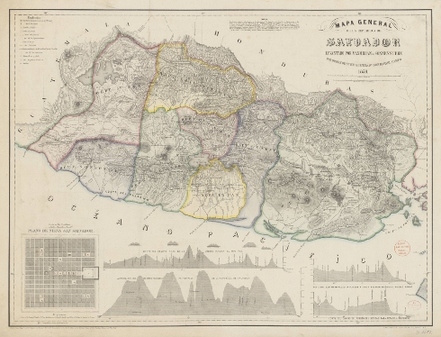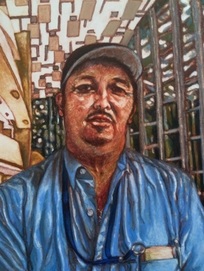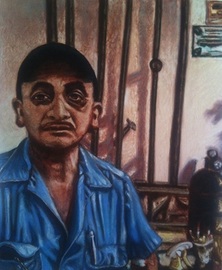VOLUME 9 (2012)
THE ORIGINS OF CENTRAL AMERICAN NARRATIVE

|
comentario editorial
|
comentario editorial
- The Origins of Central American Narrative
Brian Davisson & Karina Zelaya, University of California, Davis
perspectives
- Articulando modernidades heterogéneas: producción literaria centroamericana a fines del siglo diecinueve y principios del veinte
Arturo Arias, University of Texas at Austin
arquivo
- El primer mapa oficial de la República de El Salvador (1858)
Carlos Cañas Dinarte, Academia Salvadoreña de la Historia
enfoques
- Humor, Irony and Surrealism in Luis Cardoza y Aragón’s Maelstrom: Films telescopiados (1926)
Adrian Kane, Boise State University - Caballos tropicales y otras fieras: crítica y límites del discurso crítico de Rafael Arévalo Martínez
Claudia S. García, University of Nebraska at Omaha - De conflictos y ambigüedades: estrategias de representación del héroe costarricense Juan Santamaría
Verónica Ríos, University of Texas at Austin - El personaje de Blanca Olmedo: cuando escribir “era oficio de hombres”
Ericka Parra, Valdosta State University - Una incurable tristeza de raza: La figura del indígena en la literatura salvadoreña (1880-1910)
Ricardo Roque-Baldovinos, Universidad Centroamericana José Simeón Cañas - La representación del indio en las generaciones del 10 y del 20 en Guatemala: Carlos Wyld Ospina y Carlos Samayoa Chinchilla
Marta Casaús, Universidad Autónoma de Madrid
en route
- Teaching the Periphery: Central American Literature and Culture in the Classroom
Julia Medina, University of San Diego
Yajaira M. Padilla, The University of Kansas
Yansi Pérez, Carleton College
arte factu
- Works from American Dream Blues: “Cesar” & “Rigoberto”
Beatriz Cortez California State University, Northridge
topographies
- Problematizing a Century of Central American History, Geography, and Subjectivity: A Conversation with Ana Patricia Rodríguez
Brian Davisson & Karina Zelaya, University of California, Davis


travesía crítica
- Viajar y escribir: El trópico como tema y destino en Tropical Travel: The Representation of Central America in the Nineteenth Century, de Juan Carlos Vargas
Ana María Ferreira, Georgetown University - Apuntes sobre el diario de un viajero iraquí en la América del siglo XVII: Un viaje poco conocido: la visita de Elías al-Mawsili, sacerdote caldeo iraquí, a la America Colonial (1669?-1680), de Roberto Marín Guzmán
Sandra García Sanborn, California State University, Stanislaus - Un decadentismo creativo: Eros pervertido. La novela decadente en el modernismo hispanoamericano, de Karen Poe
Bernal Herrera, Universidad de Costa Rica - Oral history and subaltern studies in the recovery of repressed narratives in western El Salvador: To Rise in Darkness: Revolution, Repression, and Memory in El Salvador, 1920–1932, by Jeffrey L. Gould & Aldo A. Lauria-Santiago
Andrew Kerr, University of California, Davis - Hacia una nueva aproximación a la literature centroamericana: El tropo del transistmo en Dividing the Isthmus: Central American Transnational Histories, Literature and Culture, de Ana Patricia Rodriguez
Oriel María Siu, University of California, Los Angeles - Unearthing the Graves: a Forceful Approach to Historicizing Insurrection and Oppression in El Salvador, 1920-1932: To Rise in Darkness: Revolution, Repression, and Memory in El Salvador, 1920-1932, by Jeffrey L. Gould & Aldo A. Lauria-Santiago
Elizabeth Skwiot, University of California, Davis
acknowledgements
We would like to thank the Hemispheric Institute on the Americas for providing financial and logistical support for the journal since its inception. We are likewise very grateful for the work of an exceptional editorial committee, in providing support throughout the editorial process, and in making possible the online publication of the journal for the first time. For this, we would also like to thank the Davis Humanities Institute for providing us with web hosting.
Cover Art
San Salvador: Centro Nacional de Registros-FUNDEMAS-CEL, 2011
editors & committees
Guest Editors
University of California, Davis
Brian Davisson
Karina Zelaya
Editorial Committee
University of California, Davis
Brian Davisson
Ted Geier
Valerie Hecht
Erik Larson
Arturo Vargas
Karina Zelaya
Managing Editor
University of California, Davis
Ted Geier
Avisory Commiittee
University of California, Davis
Emilio Bejel
Marc Blanchard †
Linda Egan
Inés Hernández-Ávila
Thomas Holloway
Robert McKee Irwin
Neil Larsen
Michael Lazzara
Zoila Mendoza
Víctor Montejo
Ana Peluffo
Stefano Varese
Charles Walker
Columbia University
Carlos J. Alonso
Graciela Montaldo
Wofford College
Laura Barbas-Rhoden
Clark University
Marvin D’Lugo
Peer Review Committee
University of California, Davis
Erik Larson, Editor
Jonathan Alcántar
Consuelo Cervantes
Timothy Johnson
Copy Editor
University of California, Davis
Valerie Hecht
Book Reviews Editor
University of California, Davis
Sergio Díaz-Luna
Online Content Editor
University of California, Davis
Arturo Vargas
Fordham University
Jacinto Fombona
University of Richmond
Álvaro Kaempfer
Universidad Nacional Mayor de San Marcos
María Emma Mannarelli
Universidad Central de Venezuela
Daniel Mato
Princeton University
Ricardo Piglia
Universidad de Alicante
Kevin Clark Power
Universidad Centroamericana José Simeón Cañas
Ricardo Roque-Baldovinos
Tulane University
Nicasio Urbina
University of Notre Dame
Hugo Verani
contributors
|
Thanks to the following contributors to Brújula Volume 9.
|
|
|
Arturo Arias is Professor of Latin American Literature at the University of Texas-Austin. He is a well-known expert on Central American literature, with a special emphasis on indigenous literature, as well as critical theory, race, gender and sexuality in postcolonial studies. He has published Taking their Word: Literature and the Signs of Central America (2007), The Rigoberta Menchú Controversy (2000), The Identity of the Word (1998), and Ceremonial Gestures (1998), as well as a critical edition of Miguel Angel Asturias’s Mulata de Tal (2000). From 2001 until 2003 he was president of the Latin American Studies Association. He co-wrote the film El Norte (1984), and has published six novels in Spanish. Twice winner of the Casa de las Americas Award for his fiction, and winner of the Ana Seghers Award for fiction in Germany, he was given the Miguel Angel Asturias National Award for Lifetime Achievement in Literature in 2008 in his native Guatemala.
Carlos Cañas Dinarte (El Salvador, 1971) es graduado en Literatura, pero ha desplegado trabajo en ámbitos, como la investigación histórica, la edición de libros y la divulgación cultural. Miembro de número de la Academia Salvadoreña de la Historia, entre sus obras destacan el Diccionario de autoras y autores de El Salvador (2002), Historia de la energía geotérmica en El Salvador (2005) y el Atlas histórico-cartográfico de El Salvador 1529-1909 (2011, en coautoría con Pedro Escalante Arce). Marta Elena Casaús Arzú es Profesora Titular de Historia de América de la Universidad Autónoma de Madrid, Directora del Master Europeo en Estudios Latinoamericanos: Complejidad Social y Diversidad Cultural (España) y del Master en Gerencia para el Desarrollo Sostenible (Guatemala). Sus publicaciones incluyen, Las redes intelectuales centroamericanas, un siglo de imaginarios nacionales, 1820-1920 (coautora con Teresa García Giraldez, 2004); La metamorfosis del Racismo en Guatemala (2003); y la 3º reedición de su libro, Guatemala: linaje y racismo (2007). Su libro mas reciente es, El lenguaje de los ismos, conceptos vertebradotes de la modernidad (2010). Beatriz Cortez is the current director of the Central American Research and Policy Institute in Los Angles. She is also a Professor in the Central American Studies Program at California State University, Northridge. She specializes in contemporary Central American literatures and cultures from the perspective of gender, identity, and cultural studies. She is the author of a number of articles on postwar Central American literature and culture, exile, the construction of identity and gender. She has also translated a number of literary and academic texts from Spanish into English. Her book, Aesthetics of Cynicism: Post-War Central American Fiction, was published in July, 2010 by F&G Editores in Guatamala. Brian Davisson is currently a lecturer in Comparative Literature at the University of California-Davis. His research focuses on nationalism, historiography, and spatial theory in 20th century Central American, Caribbean, and peninsular Spanish literature. He has published articles and reviews on Central American and Spanish literature in A Contracorriente, Brújula, The Bulletin of Hispanic Studies, and Symposium. He will begin teaching as an Assistant Professor of Spanish at Mississippi State University in the fall. Ana Maria Ferreira is a PhD. candidate at Georgetown University in the Literature and Cultural Studies Program. She is originally from Bogotá, Colombia, where she studied Literature at the Pontificia Universidad Javeriana and earned an MA degrees in Latin American Literature. She also holds an MA in Literature and Cultural Studies at Georgetown University. She published a book which featured young indigenous writers who share their experiences leaving their communities in the Guajira desert and moving to Bogota, Colombia. She is currently working on cannibalism during Colonial times. Claudia S. García es profesora asistente del español en la Universidad de Nebraska-Omaha. Sus áreas de investigación incluyen la literatura guatemalteca y las literaturas contemporáneas centroamericanas. Sus publicaciones recientes incluyen los artículos “Mirando al bies. Homosexualidad y patriarcado en ‘Un día en la vida de Güicoyón Pérez’, de Mildred Hernández y Labios, de Maurice Echeverría”, Istmo 19 (julio-diciembre 2009) y “Territorialidad fantasmática y periferias: Una lectura de La orilla africana, de Rodrigo Rey Rosa”, A Contracorriente 2 (Winter 2009): 21-45. Sandra García Sanborn is Lecturer in Spanish at California State University, Stanislaus where she teaches a variety of courses in Hispanic languages and literatures. Bernal Herrera, Ph.D. en Literaturas Hispánicas en Harvard University y M.Ph. en Filosofía en la Universidad de Costa Rica (UCR), donde es Catedrático de Filosofía y Literatura, y donde dirigió los Posgrados en Artes y en Literatura, y el Doctorado en Estudios de la Sociedad y la Cultura. Autor de dos libros y de numerosos ensayos en revistas académicas, actualmente investiga las relaciones entre modernidad y colonialidad. Adrian Kane is Assistant Professor of Spanish at Boise State University. His areas of research include twentieth and twenty-first century Mexican and Central American fiction, the Latin American Avant-Garde, Latin American postmodern fiction, post-civil war Central American fiction, and ecocriticism. His publications include the articles “Ludics as Subversion in Arturo Arias’s Sopa de caracol”, Bulletin of Spanish Studies 86.4 (June 2009): 513-27 and “Entre el criollismo y el vanguardismo: El tigre de Flavio Herrera”, Istmo: Revista virtual de estudios literarios y culturales centroamericanos 16 (Jan.-June 2008), and an edited volume, The Natural World in Latin American Literatures: Ecocritical Essays on Twentieth-Century Writings, Jefferson, NC: McFarland & Co. (2010), which includes his chapter “Nature and the Discourse of Modernity in Spanish American Avant-Garde Fiction.” Andrew Kerr is currently pursuing his Ph.D. in History at UC Davis with interests in U.S. Empire as well as Latin American, Environmental and Post-Colonial history at the University of California-Davis. His dissertation is tentatively titled: “The Fight for Vieques, Puerto Rico – A Story of Empire and Environmentalism during the Cold War.” His research analyzes the contested relationships between the U.S. military and communities located in the margins of the American empire. It also examines the intersection of environmentalism and the politics of national security. Julia M. Medina is Assistant Professor of Spanish at the University of San Diego. She specializes in nineteenth and twentieth century Latin American literature and critical theory. She has published articles that deal with political manifestoes, photographic images, cartoons, and prologues. Her current research focuses on the intersection between visual culture, non-fiction, resistance, and intellectual representations in Central America. She has published articles on Rubén Dario and Sandino in Revista Iberoamericana and in Istmo. Yajaira M. Padilla is Associate Professor of Central American Literature and Latina/o Literatures in the Department of Spanish and Portuguese at The University of Kansas. She has published articles on Central American and U.S. Central American Literature inLatin American Perspectives, Latino Studies, and the Arizona Journal of Hispanic Cultural Studies. Her book Changing Women, Changing Nation: Female Agency, Nationhood, and Identity in Trans-Salvadoran Narratives is forthcoming in June 2012 from SUNY Press. Dr. Ericka Parra is Associate Professor of Spanish at Valdosta State University. She holds B.A. and M.A. degrees in Latin American Studies from the Universidad Nacional Autónoma de México; an MA in Teaching Foreign Languages from Illinois State University; and a Ph.D. in Spanish and Latin American Literatures and Cultures form the University of Florida. Yansi Pérez is Assistant Professor of Spanish at Carleton College. She is a specialist in Central American and Cuban literature and teaches courses on Latin American literature and culture. Her main areas of interest are the intersection of literature and politics and the politics of memory. Currently, she is working on a book which studies the many faces of history in the work of the Salvadoran poet Roque Dalton. She has articles about contemporary Central American literature and the poetry of Roque Dalton. Verónica Ríos is a doctoral student in Hispanic Literature at the University of Texas at Austin. Her publications include “¿Qué significa para los historiadores hablar de fronteras entre la Historia y la Literatura? Acerca del folleto Historia: ¿ciencia, disciplina social o práctica literaria?”, Revista Diálogos 8/2 (2007), and “‘El elefante birmano’ de Uriel Quesada: una trasgresión al imaginario nacional”, Revista Káñina 30/2 (2006): 139-144. Ana Patricia Rodríguez is Associate Professor in the Department of Spanish and Portuguese and U.S. Latina/o Studies at the University of Maryland, College Park, where she teaches courses in Latin American, Central American, and U.S. Latina/o literatures and cultures. Professor Rodríguez has published numerous articles on the cultural production of Latinas/os in the United States and of Central Americans in the isthmus and in the wider Central American diaspora. Her book Dividing the Isthmus: Central American Transnational Histories, Literatures, and Cultures was published by the University of Texas Press in 2009. Ricardo Roque-Baldovinos obtuvo su doctorado en Literaturas Hispánicas por la Universidad de Minnesota. Profesor del Departamento de Comunicaciones y Cultura, de la Universidad Centroamericana José Simeón Cañas, El Salvador e Investigador en la Dirección Nacional de Investigación en Arte y Cultura de la Secretaría de Cultura. Es autor del libro de ensayos Arte y Parte (2002), editor de la narrativa completa de Salarrué y, junto a Valeria Grinberg, de Tensiones de la Modernidad, segundo tomo deHacia una historia de las literaturas Centroamericanas (2010). Oriel María Siu, from San Pedro Sula, Honduras, migrated to Los Angeles in 1997. She has since then dedicated herself to the creation of cultural and academic spaces for the growing Central American community in the area, helping to found the first Central American Studies Program at California State University, Northridge in 1999. She holds a BA degree in Latin American Literature and Chicana/o Studies from the same university and a Masters Degree in Latin American Literature from UC Berkeley. She is currently completing her doctoral dissertation at UCLA on “La novelística de la diáspora centroamericana y la colonialidad del poder” and working towards the publication of her first book of poetry, Insilios y deserciones. Elizabeth Skwiot is a PhD candidate in Comparative Literature at UC Davis. Her dissertation, “Dangerous Acts: A Transnational Study of Gendered Passing and Performance” explores gender-related passing in Latin American narratives. She currently teaches Italian and Spanish language courses at Mount Mary College and English composition at Milwaukee School of Engineering. Karina Zelaya is a Phd candidate in the Spanish and Portuguese Department at the University of California, Davis. Her dissertation “Cuscatlán Reapropiada: El indígena y el mitopopular en la construcción de la identidad nacional salvadoreña en el siglo XX” provides a study of the literary representation of the popular myth and the indigenous figure in relation to the construction of Salvadoran national identity in the 20th century. She has been a member of Brújula’s Editorial Committee for five years. She currently teaches University Writing and Central American literature courses for the Central American Studies Program at California State University, Northridge. |
